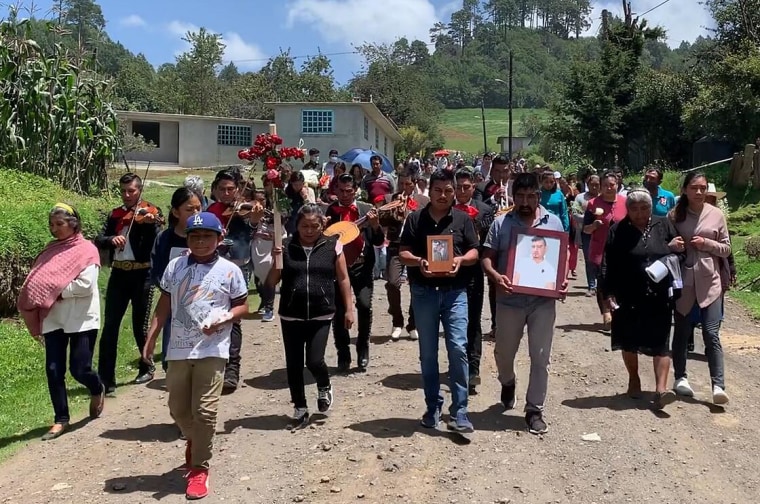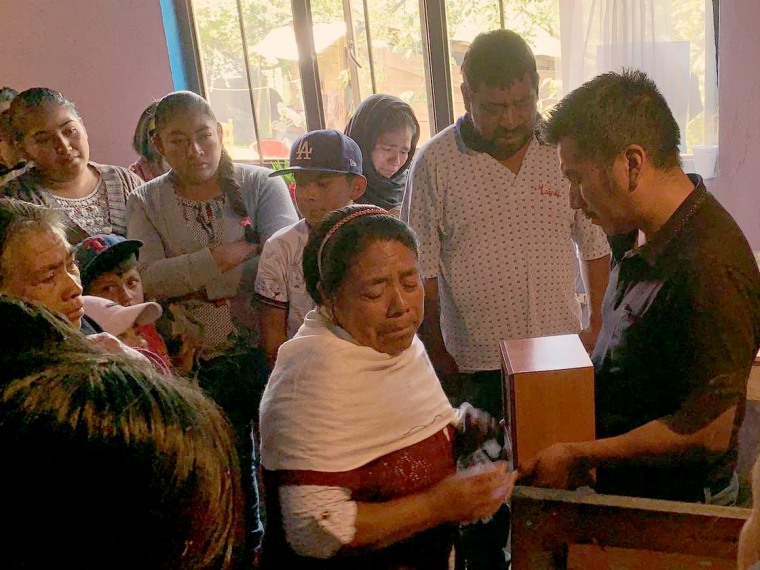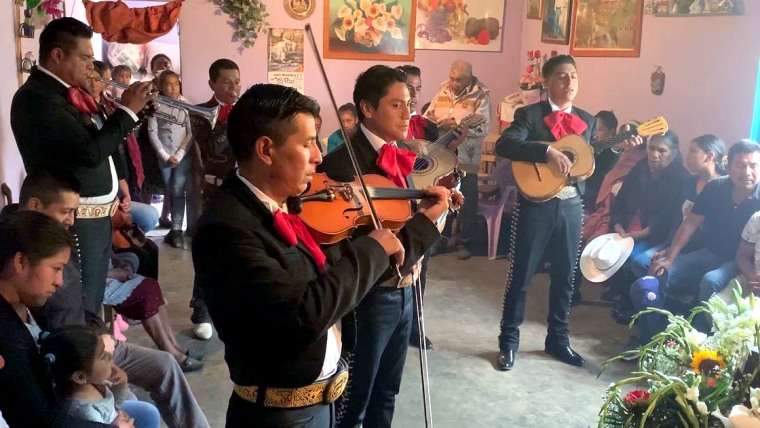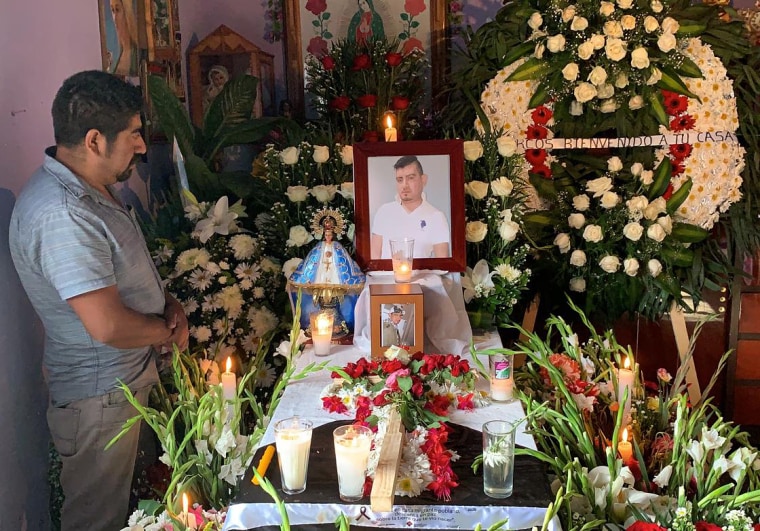PUEBLA, Mexico — There were 105 square boxes, each weighing just 4 pounds, wrapped in black fabric that gleamed in the hot sun. Arranged side by side, they contained the ashes of 105 people from the Mexican state of Puebla who at some point in their lives migrated more than 2,500 miles to pursue the American Dream in New York City.
Now, their remains were back home, in small square boxes in the hot sun, after they lost their lives to the coronavirus.
"Those ashes are all we have left of him, but we had to have them," María Fernanda Argüello said about her brother Marcos Argüello Ortiz, who had left Mexico 12 years earlier and died in a New York City hospital on April 24, at age 34, when doctors disconnected him from his respirator.
Puebla Gov. Miguel Barbosa Huerta — who is remembered for his false claim that the poor are "immune" to COVID-19 — asked for forgiveness for his remarks in a brief ceremony July 14.
During the official ceremony in Puebla, the deceased were described as heroes.
Full coverage of the coronavirus outbreak
Those who died in New York City had crossed the border to work in the U.S. as drivers, gardeners, dishwashers, cooks, deliverymen, workers, maids, waitresses, cleaners or janitors. Although they were undocumented, their work was considered essential, so they continued to show up even as the coronavirus infected more than 4.6 million people in the U.S. and killed over 156,000.
After the ceremony, the family was taking Argüello's remains to La Providencia, two hours away, where he was born and raised.
'A terrible month, like hell'
In New York City, Ricardo Téllez, who is also from Puebla, remembered Argüello.
"He was always happy and supportive. He did not forget you, nor did he leave you alone at a soccer game," Téllez said, remembering how Argüello loved to cycle quickly through Manhattan, dodging cars and zigzagging streets with a smile as he delivered food for a Mexican restaurant.
"April was a terrible month, like hell," said Téllez, who also got the coronavirus around that time. After Téllez felt better, he reached out to Argüello — who was in the hospital — through Facebook.
"I came because the cough was going to kill me," he said Argüello wrote to him. "I hope to get out of this nightmare soon."
Latinos have been disproportionately affected by the pandemic; of the more than 18,900 people to have died in New York City, nearly a third were Latino. According to the Mexican Foreign Ministry, at least 1,863 Mexicans have died in the U.S. from the coronavirus. New York tops the list with 760 deaths.
Immigrants like Argüello, who often have little access to medical resources and can sometimes suffer from other health conditions, "cannot keep a healthy distance because they usually rent houses where up to 12 or 15 people live" to save money, said Ricardo Andrade, president of Fundación Pies Secos, a nonprofit. "There is always contact with others in the kitchen, the living room or the bathrooms. Unfortunately, there are cases in which entire families were infected."

Esmeralda Velázquez, another friend, helped take care of Argüello when he first got ill in late March and recalled how he deteriorated. "He had come many times to my house, but on that occasion he got lost. He told me that he didn't know where he was, that he was disoriented, so I went downstairs and saw him — going the other way," Velázquez said.
They went up to her apartment, and they isolated him in a room, but he kept coughing. The echo of his breathing could be heard in the house, and his nose began to bleed; he vomited blood clots. "I thought his lungs were bursting. I was scared," Velázquez said. "So I dressed him, and around 5 in the morning, we took him to the hospital because he could hardly walk."
Soon after, she and her husband, Rubén Castellanos, as well as their six children, began to show symptoms of the virus. She said she felt remorse because they all got better — but not her friend.
'You are going to be with your dad'
Velázquez had the opportunity to say goodbye to Argüello at the hospital. She pulled on her protective suit and, between sobs, was able to speak to him one last time while the machines kept him alive.
"You are going to be with your dad who you always cried for. I am going to show this to your godchildren," she told Argüello about the last video she has of him. "It is the only thing they are going to have now.
Argüello's friends in New York described the delays and frustrations over obtaining his remains so they could send them to Mexico. "We paid about $1,800 for the cremation, and they gave it to us in a cardboard box," said Téllez, who along with other friends created a GoFundMe campaign to defray expenses.
Ixelt Romero Morales, director of the Poblano Institute for Assistance to Migrants, said that is what many relatives and friends are going through as they work to bring coronavirus victims' remains back home.
Argüello's New York City friends finally received his ashes on May 27, more than a month after his death. The next day, they celebrated his 35th birthday with a small gathering of relatives who ate aguachile and cake and prayed the rosary for his soul. They listened to the cumbia and northern music that Argüello liked so much.
Almost a month later, on June 22, Argüello's friends were able to deliver his ashes to the Mexican Consulate in New York, where the government of President Andrés Manuel López Obrador launched a program to fly back coronavirus victims' remains, also offering aid of up to $1,800 for funeral expenses.
The remains of Argüello and 250 other people from Puebla, Oaxaca and Veracruz arrived in Mexico on July 13.
'México lindo y querido,' beautiful and loved, as song goes
Argüello dreamed of returning to his homeland to marry and start a family. He had already told his mother that he would visit her this year, and he joked that he would knock on the door when she least expected it.
"He could never come in all these years, and now what we have are his little ashes," Carolina Ortiz, 57, his mother, said tearfully.
Dressed in black, with a faraway demeanor, Ortiz recalled the long conversations with her son, his good humor and the adventures he recounted about life in New York, delivering orders.
The ashes had arrived the day before, and her humble home had become the center of attention in La Providencia, a small town of just 800 inhabitants very close to the border with Veracruz.

When she turned to look at the wooden box with the photo of her son, surrounded by flowers, figures of the virgin and candles, her voice broke and she cried: "He left because my husband died in a traffic accident. He was the youngest, and he was brave, because here they pay almost nothing. It was not enough for us. I see his photos, and they make me want to cuddle him, to feel him, but now we'll have to fight to keep going on."
Puebla is the Mexican state with the third-highest number of immigrants in the U.S., about 56,000, the majority in New York. Last year, they set a record, sending $1.7 billion in remittances to their loved ones back home.
Download the NBC News app for full coverage and alerts about the coronavirus outbreak
The last day of Marcos Argüello's long journey started very early for his relatives.
His two brothers and several cousins went to the churchyard, on the outskirts of town, to dig the grave. "He could never come anymore, with this problem of the epidemic. We realized that he was ill, and they put him in the hospital, but he could no longer leave," said his brother Miguel Argüello, 40.
Taking a breather and sitting on a grave, he pointed out the surrounding fields and remembers when he worked in the fields with his brother. They planted corn, potatoes, whatever they could, but it was not enough. It is the tragedy of La Providencia, of fertile deep black lands that one cannot live on anymore.
That is why people emigrate, whether or not there is a pandemic, which also exists in Mexico.
"It is always scary that the epidemic will hit you, but you have to get out. I have my children. They have to eat, and I have to go out to work for them," Miguel Argüello said.

Moisés Argüello, Marcos' other brother, was keeping track of the preparations: the depth of the pit, the cooking of the carnitas over low heat in the patio of the family home, the beginning of prayers and the mariachis. "Here we are all doing well, thank God. No one has gotten sick. The only bad thing is that there is almost no work," he said.
More than 60 people gathered during the funeral, but none wore masks or maintained social distancing.
The mariachis arrived, and the family burst into tears when they heard the words of a popular and heartbreaking song, "México lindo y querido," which means "pretty and beloved Mexico."
"If I die far from you / Let them say I'm asleep / And bring me back here," the song says.
His sister Cleotilde sobbed silently. She had to leave Mexico City with her two daughters because of the pandemic, and now she lives in Texcoco, in the state of Mexico. She lost her job as a cleaning person, and her husband, who is a bricklayer, is also unemployed.
"He left so that we never lacked anything. He sacrificed himself very hard, and we are going to miss him very much," she said of her brother.
At noon, more than 60 family and friends began the slow, mile-long procession to the churchyard. Once the ashes were placed on a table at the pantheon, they lined up to hug the wooden box, touch it and kiss it, look at his photograph or simply cry. There are no priests, only his family and friends — those who ran and played soccer with him in those rustic streets, danced at the patron saint festivals and worked alongside him in the fields — now saying goodbye.
At 1 in the afternoon, they buried him several meters underground, next to his father. His 12-year journey north and back was over.
An earlier version of this story was first published in Noticias Telemundo.

